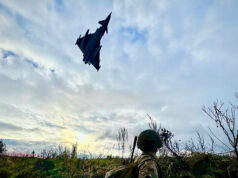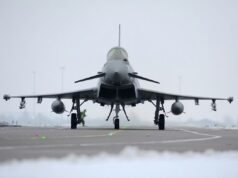Admiral Sir Tony Radakin, Chief of the Defence Staff, delivered a stark warning about the threats facing British sovereignty and infrastructure during his annual lecture at the Royal United Services Institute (RUSI).
While Britain may feel relatively secure compared to nations like Ukraine or Poland, Radakin underlined that the country is not immune to the consequences of a more unstable global order.
Radakin described a world increasingly divided into three groups: authoritarian states challenging international rules, responsible nations committed to stability, and countries hedging between the two for advantage. He singled out Russia, China, North Korea, and Iran as disruptive actors, each pursuing their own agendas at the expense of global norms.
Russia’s aggression in Ukraine, China’s efforts to reshape international rules to suit its interests, and rogue states like Iran and North Korea seeking regime survival through destabilising actions highlight the challenges to global security. Radakin argued that abstract concepts like sovereignty, deterrence, and freedom of navigation have tangible impacts, especially in regions under direct threat.
“The concept of sovereignty is real for the people of Ukraine, who are paying an extraordinary price in its defence,” he said.
He cited the devastating effects of Russia’s actions in the Black Sea on global food security and the threats to merchant mariners from Iranian-supplied missiles in the Red Sea as examples of how instability reverberates beyond conflict zones.
While geographically protected by maritime borders and the strength of NATO, Radakin warned that Britain is not insulated from global instability.
“Our national airspace and territorial waters, our critical energy and digital infrastructure, and our public discourse have all been subject to interference,” he stated.
The frequency of cyberattacks targeting British networks continues to rise, driven by both rogue individuals and hostile states. Radakin also highlighted a Europe-wide campaign of arson and sabotage, which intelligence chiefs have described as “a sustained mission to generate mayhem” and “beyond irresponsible.”
The repercussions of global instability extend to British citizens in everyday life. Radakin noted the impact on the cost of living, energy subsidies, and economic stagnation as markets react to uncertainty.
“The security outlook is more contested, more ambiguous, and more dangerous than we have known in our careers,” Radakin said, calling for vigilance and adaptability in navigating this complex landscape.
At the UK Defence Journal, we aim to deliver accurate and timely news on defence matters. We rely on the support of readers like you to maintain our independence and high-quality journalism. Please consider making a one-off donation to help us continue our work. Click here to donate. Thank you for your support!














Should we be returning the cyber and cable attacks back at the perpetrators?
Conventional threats from Russia are the submarines and their missiles along with any missiles that can be launched from Russian territory. The air force isn’t getting out of Russia without it being known about.
The unconventional can be equally scary as they have years to plan and it’s leaves the U.K. with very little time to fix the issues caused.
Cyber, I hope we are. That was one justification to form the NCF.
On the cables, accidents of geography make that less simple. Russian and Chinese cables will predominantly be beneath their own landmass, not the seas where submarines can interfere with them. The USN tapped a cable in the Sea of Okhotsk decades ago that ran between Kamachatka and Sakhalin.
Most Russian cables will run west east beneath the Russian landmass, how do you access them without sabotage within their borders.
““Our national airspace and territorial waters, our critical energy and digital infrastructure, and our public discourse have all been subject to interference,” he stated.”
Don’t worry. Lord Robertson and General Barons are currently briefing the HoC DSC on the need for autonomous systems, Cyber, and AI, and won’t be filling any holes.
A contradiction, as elsewhere GBAD of UK is apparently a top priority.
I’m sure the AI and autonomous Drones we never buy will physically go and intercept planes in our airspace.
GBAD ? Why would they waste money on that, technology and drones are the end all now, can get someone with a Mavic drone in their back garden to intercept an ICBM…
I’m sure they’ll be announcing shortly the AI that can take out an enemy armoured brigade somehow without all the weapons systems they don’t actually order.
Clearly it is the public discourse that must be the top priority for intervention because without political will none of the other things will get sufficient attention. Cyber crime is a diverse threat to companies (tax revenue providers) as well as the national infrastructure, whether public or private. The historic under-investment in NHS IT to defeat cyber-attack is a failure to direct their priorities correctly. Of course the strategic objective is effective healthcare free at the point of use, according to medical need. None of that happens without the technical platforms to enable it, be that MRI Imaging suites or the back-office; supplies or personnel management. That the IT functions have been allowed to drift into obsolescence, out of manufacturers security patch cycles, or were never built to be resilient, shows that the senior management doesn’t know about IT and doesn’t care to employ people who do know, and fund their efforts.
The Peace Dividend delusion has allowed politicians to assure their electoral outcomes by swapping defence spending for social provision. Even a war in Europe has not been enough for them to pivot back to defence, despite defence of the realm being the first responsibility of the nation state.
Here is an interesting piece on the poverty of ambition and understanding that has been achieved over decades by our enemies using misinformation and interference, as mentioned by Admiral Radakin.
https :// ukandeu.ac.uk/ making-the-domestic-case-for-defence-spending-in-the-era-of-trump/
(copy and paste, then remove spaces for use)
Lions led by donkeys.
It is difficult to free fools from the chains that they revere.